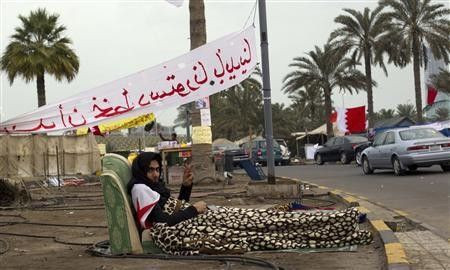Bahrain F1 cancelled; opposition leader to return

The March opening race of the Formula One season in Bahrain was cancelled on Monday, as the country's opposition prepared to press for change in country's Sunni leadership, backed by protesters camped out in streets.
The March 13 race was thrown into doubt after mainly Shi'ite protesters took to the streets of the capital of Manama a week ago, demanding political reform and energised by popular revolts that toppled the rulers of Tunisia and Egypt.
At the present time the country's entire attention is focussed on building a new national dialogue for Bahrain, Crown Prince Sheikh Salman bin Hamad al-Khalifa said in a statement.
After the events of the past week, our nation's priority is on overcoming tragedy, healing divisions and rediscovering the fabric that draws this country together, said Salman, who was appointed by King Hamad bin Isa al-Khalifa to lead a national dialogue.
Plans by an exiled Shi'ite leader to return home raised the stakes in a power struggle in the island nation as Haq movement leader Hassan Mushaimaa, tried in absentia in Bahrain for attempting to topple the government, said he would fly back from London on Tuesday.
Mushaimaa's Facebook page said he wanted to see if this leadership is serious about dialogue and if it will arrest him or not. An arrest warrant for Mushaimaa is outstanding.
King Hamad bin Isa al-Khalifa has asked his son, the crown prince, to conduct a dialogue with all parties, but after the bloodshed on the streets, in which seven people were killed and hundreds wounded, opposition parties are wary.
Haq is more radical than the Shi'ite Wefaq party, from which it split in 2006 when Wefaq contested a parliamentary election. Wefaq's 17 MPs resigned last week in protest at the violence.
They (Haq) are less likely to take a conciliatory position towards the regime, Shadi Hamid of the Doha Brookings Centre said. They are not yet explicitly calling for its downfall, but they are not interested in being part of the system.
Haq's leaders often have been arrested in recent years, only to receive royal pardons. Some were rearrested in a crackdown in August, when 25 Shi'ite activists, including 23 now on trial, were charged with trying to overthrow the government violently.
In a rare protest in nearby Kuwait, dozens of demonstrators waving Bahraini and Kuwaiti flags gathered in front of parliament in support of Bahraini protesters, a resident said.
One carried a picture of an injured protester, with the text: Where is democracy?. They later dispersed peacefully.
PROTESTERS PACK PEARL SQUARE
Up to 10,000 people again packed Pearl Square, at the heart of week-long protests led by majority Shi'ites demanding more say in the Gulf Arab country, a close U.S. and Saudi ally.
More than 1,500 striking teachers joined them to back demands for change. No teaching until the government falls, they chanted.
The opposition is demanding a true constitutional monarchy that gives citizens a greater role in a directly elected government. It also wants the release of political prisoners.
In the eyes of the people the government has already fallen, said Amir Ahmed, 38, a government oil-sector employee.
The demonstrators in Pearl Square were impatient for change after seeing entrenched rulers in Egypt and Tunisia depart.
Lamia, a 26-year-old primary school teacher, said Bahrain would also topple its leaders. We are much stronger than them and we hope it will happen as soon as possible, she said.
U.S. Secretary of State Hillary Clinton condemned any attempt by Bahraini security forces to crush peaceful protests on the island, which hosts the U.S. Navy's Fifth Fleet.
We've been very clear from the beginning that we do not want to see any violence. We deplore it. We think it is absolutely unacceptable, she told ABC News on Sunday.
Neighbouring Saudi Arabia, the world's top oil producer which has a restive Shi'ite minority of its own, has called for a return of peace and stability, saying it stood with all its power behind the state and the people of Bahrain.
Although Shi'ite Muslims account for about 70 percent of the population, they are a minority in Bahrain's 40-seat parliament due to an electoral process that they say shuts them out.
This, coupled with systemic discrimination, blocks them from decision-making and access to state jobs and housing, they say. The government denies that it treats Shi'ites unfairly.
The al-Khalifa family, which has ruled Bahrain for 200 years, dominates a cabinet led by the king's uncle, who has been prime minister for 40 years since independence in 1971.
The Bahraini regime is still behind the curve, Hamid said. They are not willing to meet the demands of protesters, even something simple like sacking the prime minister.
He said the Sunni ruling family faced tough choices.
Democracy would mean the Sunni minority giving up power and accepting the possibility that Shi'ites would play a leading role in governing the country. How do you square that circle?
© Copyright Thomson Reuters {{Year}}. All rights reserved.





















